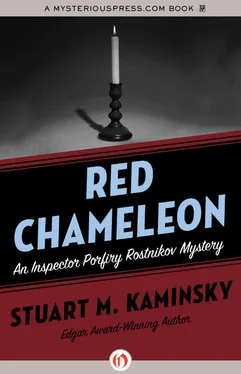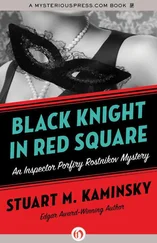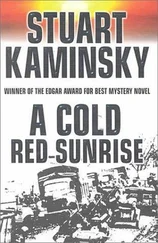Stuart Kaminsky - Red Chameleon
Здесь есть возможность читать онлайн «Stuart Kaminsky - Red Chameleon» весь текст электронной книги совершенно бесплатно (целиком полную версию без сокращений). В некоторых случаях можно слушать аудио, скачать через торрент в формате fb2 и присутствует краткое содержание. Год выпуска: 2012, ISBN: 2012, Издательство: MysteriousPress.com/Open Road, Жанр: Полицейский детектив, на английском языке. Описание произведения, (предисловие) а так же отзывы посетителей доступны на портале библиотеки ЛибКат.
- Название:Red Chameleon
- Автор:
- Издательство:MysteriousPress.com/Open Road
- Жанр:
- Год:2012
- ISBN:978-1-4532-6632-8
- Рейтинг книги:4 / 5. Голосов: 1
-
Избранное:Добавить в избранное
- Отзывы:
-
Ваша оценка:
- 80
- 1
- 2
- 3
- 4
- 5
Red Chameleon: краткое содержание, описание и аннотация
Предлагаем к чтению аннотацию, описание, краткое содержание или предисловие (зависит от того, что написал сам автор книги «Red Chameleon»). Если вы не нашли необходимую информацию о книге — напишите в комментариях, мы постараемся отыскать её.
Red Chameleon — читать онлайн бесплатно полную книгу (весь текст) целиком
Ниже представлен текст книги, разбитый по страницам. Система сохранения места последней прочитанной страницы, позволяет с удобством читать онлайн бесплатно книгу «Red Chameleon», без необходимости каждый раз заново искать на чём Вы остановились. Поставьте закладку, и сможете в любой момент перейти на страницу, на которой закончили чтение.
Интервал:
Закладка:
“Never,” Mikiyovich said indignantly.
“You had been warned about getting drunk on duty, so you went up to the roof,” Karpo went on. “If you lie to me again, we go to Petrovka for a talk.”
“I went to the roof to drink,” the man said, shifting himself inside of his slightly oversized uniform.
“And,” Karpo prompted.
Behind them on the Prospekt a Zaporozhets-968 automobile tried to pass a bus and caught a piece of the bus’s rear fender. Bus driver and car driver raised their fists at each other, and the car sped on.
“There’s nothing to tell,” Mikiyovich said, sighing. “In the dark I heard something, a snap, something, maybe a gunshot, maybe not. It came from the far end of the roof overlooking the front of the hotel.”
“You saw nothing?” Karpo said.
“Nothing,” Mikiyovich said, shaking his head firmly to emphasize his lack of information. “Too dark and I was not curious. I am not a coward. I was in the army. I have a medal for the Battle of Leningrad.”
“And you knew Lenin,” Karpo said without a trace of sarcasm.
“I saw him once when I was a boy,” the man said proudly.
“I do not doubt that you are a hero,” Karpo said. “What did you hear?”
“Crying, just crying.”
“Man or woman? “
“Who knows?”
“Guess,” Karpo prodded, moving slightly so the sun would fall directly on the man as he tried to look up at the policeman.
“A man,” Mikiyovich said.
“Old, young?”
“More young than old,” the man said. “I’m guessing.”
“Big or small man?” Karpo went on.
“Big or small-how should I know? Can I see in the darkness?”
“Did it sound like a big or small man? The weeping, any movement.”
“A regular man,” the old man said. “He wept. He coughed. A regular man.”
“He coughed?” Karpo asked.
“He coughed,” Mikiyovich agreed, coughing to demonstrate how insignificant the sound was.
“What kind of cough?”
“What kind of cough?” the old man repeated as if he were talking to a madman but remembering that this was a police madman. “I don’t-”
“Deep, the cough of a smoker, a sick cough?”
“The first time a little cough, more like clearing the throat, and the second time a cough like when you have the grippe. Who can remember such things?”
“You remembered,” Karpo said, turning his back and walking away.
Mikiyovich shrugged his shoulders and watched the policeman move down the walk with the crowd. A shudder ran down the old man’s back, and he prayed to the unknown god that one was no longer supposed to believe in that the wounded bat of a policeman never returned to blot out the sun again. He started to take a bit of his sandwich, changed his mind, threw the remains in his bag, packed up his dominoes, and hurried to a state store where he still might be able to buy a bottle of kvass before his lunch break was over.
While Porfiry Petrovich Rostnikov was beginning to consider the facts in the case of the murder of the old Jew in a bathtub and Emil Karpo was questioning the hotel porter, Sasha Tkach was engaged in the investigation of a crime of far less moment than murder. Sasha had been selected for this investigation by the new assistant procurator because Sasha did not look like a policeman. At twenty-eight, he looked like a tall, young student. With the new clothes that had been provided for him, he looked like a prosperous young university student. His looks belied his feelings.
Sasha’s wife, Maya, was about to have a baby, and they feared the consequences of living in those two rooms with a child and Sasha’s mother, Lydia, who was becoming more and more difficult with each day. He could not afford to pay enough nalevo, money on the side, to get a new apartment. Now he stood in front of an old building that looked as if it had once been a barn, on a small street just off of Volgograd Prospekt. He had taken the Zhadanovsko-Krasnopresnenskaya line of the metro to the Tekstilshchiki station and walked the five blocks, pausing to check off the name of the shop in his notebook even before he arrived.
His task was simple and boring, to visit every known automobile repair shop in the Moscow area, both the officially listed ones and those operated unofficially. For a city the size of Moscow, the list was quite small. For an individual taking the metro in the August heat, the list was monumental.
For almost four months, a well-organized team of automobile thieves had been focusing on the cars of the very rich, the very powerful. Normally, car theft in Moscow was routine; no part of a car was even safe overnight. Drivers routinely unscrewed outside mirrors and lamps and removed windshield wipers. Complaints were frequent, but the police had more important things to do, at least until this new gang had boldly gone into operation. They had begun by stealing two black Volgas belonging to politicians of more than moderate influence. A few months later, a black Chaika had been stolen from in front of the dacha of a member of the KGB not far from the Outer Ring Road. The Chaika had belonged to an admiral. So rare are these cars that the center VIP lane of major thoroughfares, reserved for government use, are known as “Chaika Lanes.” The final blow, however, came when a black Zil limousine, the hand-tooled car that no more than two dozen members of the Politburo and a few national secretaries of the Communist Party owned, disappeared from in front of the apartment building where the then-acting head of the KGB resided. It was forcefully and officially denied to an English journalist who heard about the theft that the auto belonged to the distinguished old gentleman, but whoever it belonged to, the Zil, complete with armchair seats, air conditioning, telephones, and a bar, was gone.
The question of who might be buying these automobiles-the Zil alone would bring about $125,000 if someone dared purchase it-remained unanswered. The procurator general, however, had moved the investigation to high priority, higher than at least forty outstanding murders and a major drug ring. The highest priority, however, was given to keeping anyone from finding out about these bold and embarrassing thefts. So, boring though it might be, Tkach’s task was deemed an important one. His charge had been simple and probably impossible.
“Find these enemies of the state before they steal one more vehicle essential for the security of our government,” Assistant Procurator Khabolov had told him. And now Tkach stood in front of a building that had once been a barn.
Sasha Tkach, who had never owned a car and had seldom driven one, stepped through the side door next to the large corrugated and firmly closed steel sliding door and entered the shop.
He found himself standing in front of a wooden counter in a small customer area. The counter was covered with small pieces of metal, some of it oily but much of it rusting into the wooden counter like ancient fossils. Beyond the counter was a small open space with a concrete floor. On the floor were various unidentifiable pieces of machinery of sizes ranging from that of a coffee cup to what looked like a truck engine. A metallic buzzing filled the ill-lighted space, vibrating up Sasha’s back and down his arms.
“Hello,” he shouted.
The figure in a gray bulky one-piece work suit huddled over the piece of machinery on the floor paid no attention and continued to attack the mass of metal with a whirring tool that sent up sparks.
Remember who you are supposed to be, Sasha told himself, and he shouted again, louder, pounding a fist on the counter. Small pieces of unembedded metal jiggled and danced around his fist, and the figure with the whirring machine turned to face him, eyes hidden behind goggles. The figure turned off the machine.
Читать дальшеИнтервал:
Закладка:
Похожие книги на «Red Chameleon»
Представляем Вашему вниманию похожие книги на «Red Chameleon» списком для выбора. Мы отобрали схожую по названию и смыслу литературу в надежде предоставить читателям больше вариантов отыскать новые, интересные, ещё непрочитанные произведения.
Обсуждение, отзывы о книге «Red Chameleon» и просто собственные мнения читателей. Оставьте ваши комментарии, напишите, что Вы думаете о произведении, его смысле или главных героях. Укажите что конкретно понравилось, а что нет, и почему Вы так считаете.












